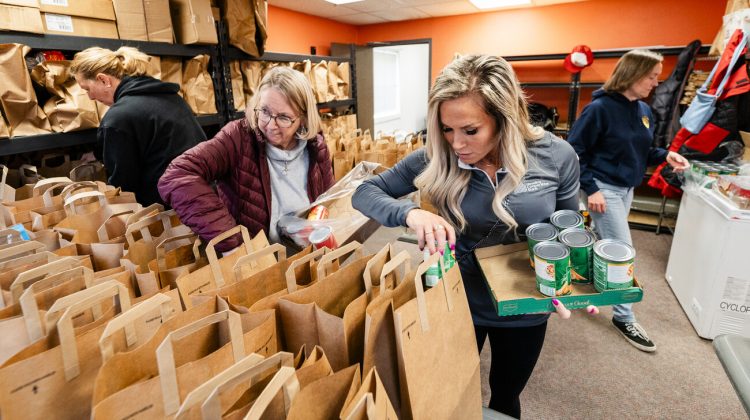LYNN — Each beginning of the month on a Monday morning, volunteers from the Rotary Club of Lynn arrive at the Salvation Army on Franklin Street with a mission: pack bags of food for hundreds of local families.
It’s a routine act of service they’ve performed for years — but one that’s becoming harder as food bank budgets shrink and the need grows.
Raymond Bastarache, a former deputy superintendent of Lynn Public Schools and longtime Rotarian and former club president was one of several volunteers filling bags with canned goods and pasta — items that would be paired with dairy and produce before distribution later in the week.
“We come the first Monday of each month to do this,” Bastarache said. “And we’ll be back on Friday with a team to hand them out. But lately, there’s been less and less food.”
The Rotary’s efforts are part of a larger collaboration with the Salvation Army, which distributes food every Tuesday, Thursday, and Friday. The need has remained steady, if not increased, with the site serving between 150 and 175 families a day.
But the supply hasn’t kept up.
“We used to get full pallets from the Greater Boston Food Bank — meat, rice, vegetables,” said Diana Perry, who oversees the food pantry at the Lynn Salvation Army. “Now, we haven’t been able to get any of that in over two weeks.”
Perry said the pantry once had a reliable overflow of goods. Now, it relies on weekly pickups from four stores, arranged by just a couple of older volunteers who load what they can — when it’s available. But even that’s often not enough.
“People think we’re well-stocked because we’re a food pantry,” Perry said. “But the truth is, we’re struggling to keep up. What used to be extra is now everything we have.”
Kimberly Lee, a Rotary member for the past three years, echoed that concern. “Today is the least amount of food I’ve seen here since I started volunteering,” she said. “It’s hard to see and harder to know people might go hungry because of it.”
Lee said the impact of the food shortages is especially visible on packing days. Bags that used to brim with a mix of dry goods and fresh produce now feel noticeably lighter. “We still give out two bags per family,” she said. “But some of those bags just aren’t what they used to be.”
Volunteers say the Salvation Army’s role has taken on even greater importance as other local pantries cut back. Perry noted that people often come to her after visiting other food sites, only to receive one small bag with a few cans and limited staples. “We try to give more — milk, eggs, cheese, meat when we have it,” she said. “We even give out steaks or pork loin if we get them donated. That’s why so many people come here.”
And while no ID is required to receive food — just proof of address — the broader climate has affected attendance in noticeable ways.
Bastarache recalled a recent food distribution where, for one of the first times, groceries went unclaimed.
“We were given a heads up that we might not see as many people as we typically do,” he said. “And sure enough, we had a pallet of carrots left over, a pallet of onions left over, and bags of groceries left over. That never happens. It was 11 o’clock. People were afraid to come out — probably because ICE was in the city. I’m just making an assumption, but there were a lot fewer people than what we usually see.”
Still, the numbers are climbing. Perry is already bracing for warmer weather and the seasonal increase in foot traffic it brings. “We’re serving 150 to 175 a day now,” she said. “When the weather gets nice, it’ll be even more.”
The Rotary Club supports the operation twice a month — packing on the first Monday and distributing on select Fridays. But their work doesn’t stop there. Bastarache, who has lived in Lynn for 78 years, also chairs the club’s scholarship and membership committees and continues recruiting others to help fill the gaps.
“We’re not in this for the credit,” he said. “There’s a lot of need in this city, and we’re here to serve. That’s what Rotary is about — service above self.”
Lee agrees. “This club is full of humble people just trying to help,” she said. “We might not have as much money to give as other clubs, but we show up. And we’re always looking for more people — especially young people — to join us.”
As prices rise and aid shrinks, the weight of food insecurity in Lynn continues to fall on the shoulders of volunteers, community groups, and nonprofits working to fill the gaps.
“It’s hard right now,” Perry said. “Hard to keep up. But we’re doing what we can — with what we have.”

